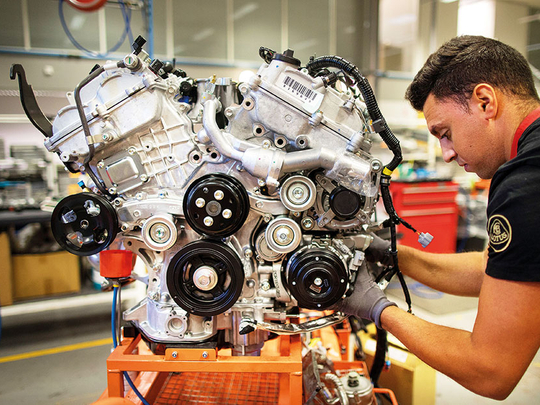
London: British manufacturers reported robust growth last month and rising inflation pressure, an industry survey showed, adding to the chances that the Bank of England (BoE) will raise interest rates on Thursday for the first time in a decade.
The HIS Markit/CIPS manufacturing purchasing managers’ index (PMI) rose to 56.3 in October from an upwardly revised 56.0 in September. That exceeded its long-run average and bucked economists’ forecasts in a Reuters poll for a slight decline.
“UK manufacturing made an impressive start to the final quarter of 2017 as increased inflows of new work encouraged firms to ramp up production once again,” said Rob Dobson, a senior economist at HIS Markit, which compiled the data.
“The domestic market remained strong, whereas new export orders increased at a slightly slower pace, the latter showing signs of being hit by the recent strengthening of sterling,” he said.
The pound gained further after Wednesday’s data, climbing to a four-and-a-half month high against the euro and its highest in two weeks against the US dollar.
Sterling is still down more than 10 per cent from its level before Britain voted to leave the European Union in June 2016, but Barclays banker Mike Rigby said his clients would be wary of further gains after Thursday’s BoE decision.
“Although demand from both home and overseas markets remains robust, manufacturers will have half an eye on what the Monetary Policy Committee decides to do tomorrow,” he said.
British manufacturers enjoyed their strongest growth this year in the three months to the end of September, data showed last week, and Dobson said the sector appeared to be continuing to expand at a quarterly rate of around 1 per cent.
The economy overall saw only lacklustre growth in the third quarter, expanding by 0.4 per cent for its weakest year-on-year growth in four years.
Nonetheless, most economists polled by Reuters expect the BoE to raise rates for the first time in a decade on Thursday, increasing the Bank Rate to 0.5 per cent from a record-low 0.25 per cent.
Central bankers are likely to be concerned by signs of growing inflation pressure in the PMI survey. Manufacturers reported that raw-material costs were rising by the most since March, and in turn they were increasing the prices they charged customers at the fastest rate since April.
Headline consumer price inflation reached a five-year high of 3 per cent in September, and the cost of raw materials rose 8.4 per cent on the year, according to official data.
The National Institute of Economic and Social Research, an academic research body, said weaker productivity meant Thursday was likely to mark the start of a series of rate rises from the BoE, peaking at 2 per cent in 2021.
The BoE has previously said that any rate rises would be limited and gradual, and most economists polled by Reuters doubt rates will increase at all next year.












